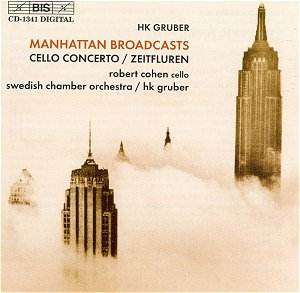Described by Norman
Lebrecht as ‘a wacky Viennese’, Heinz
Karl Gruber has left himself open to
a certain amount of ridicule, particularly
with his Third Viennese School antics.
He is probably best known for his cabaret-style
entertainment Frankenstein!,
which is great fun, and no one should
be put off the present disc by sneering
critics or the man’s reputation. All
the music here is eminently approachable,
even slightly old-fashioned, and at
its best is very well crafted and atmospheric.
Undoubtedly the most
substantial work is the Cello
Concerto, commissioned by the
Koussevitsky Foundation and premiered
by Yo-Yo Ma and the Boston Musica Viva
at Tanglewood in 1989. The structure
is that of a single movement with developing
variations. Gruber quickly lightens
the rather sombre opening mood by infusions
of some of his favourite elements, particularly
jazz and light music. The chamber-sized
orchestra is used with great delicacy
and there is playfulness to some of
the exchanges between soloist and featured
instruments (such as 12’31). The musical
language is always tonal, but the moods
do vary enormously between pathos and
near-banality, a trait that can be traced
back to his Viennese forebears, particularly
Mahler. I like the long, smoochy cello
cadenza, and there is no doubting that
the final B flat minor chord ends the
work with (to quote Paul Driver’s note)
‘something like a smile’.
The Mahler inheritance
is even plainer in the two Timescapes,
and I was tempted to apply a subtitle
to the first one (Nightdust)
along the lines of ‘Rhapsody on Mahlerian
Themes’. We get a slow funeral dirge,
rich bed of lower string texture and
musings from the cor anglais that sound
straight out of ‘Ich bin Der Welt’.
There follows a Bergian outburst from
the trombone which heralds the second
section (Another Day), and here
the faster tempo and rather more optimistic
mood provide the requisite contrast
and a reminder, as the composer tells
us, ‘that life goes on’.
The two pieces collectively
titled Manhattan Broadcasts
(Tammany Hall and Radio City)
are, as Paul Driver accurately observes
‘the reflection in a Viennese mirror
of American dance band music’. They
make a suitably upbeat end to the disc,
neither piece being much more than easy
listening, and at least Gruber does
not attempt straight parody but more
a successful fusion of disparate styles.
The recordings are,
as usual, excellent and liner notes
authoritative. The performances by Robert
Cohen and the superb Swedish orchestra,
under the composer’s direction, could
hardly be bettered. Well worth investigating.
Tony Haywood
